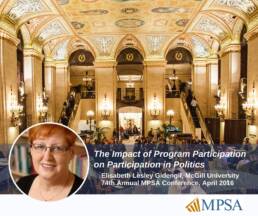Year: 2016
Controlling Agency Choke Points: Presidents and Regulatory Personnel Turnover
The following is part of a series of posts written by 2016 MPSA award recipients highlighting outstanding research presented at previous MPSA annual conferences. Presidents desire to see their priority policy goals implemented. To see these policies put into place presidents need control over…
Beyond Diversity: The Salience of Ethnicity and Kenya’s Constituency Development Fund
Following is from a series of blog posts by MPSA members about their research that has received funding by either the National Science Foundation (NSF) or the National Endowment for the Humanities (NEH). Here, Kirk A. Harris a Ph.D. Candidate at Indiana University summarizes his NSF-funded research…
Bernie Goldwater: What Sanders Supporters Can Learn from Young Americans for Freedom
Supporters were crestfallen, but their resolve was firm. Their candidate had refused to buckle to the pressure from party elite—the usual pressure from political managers, to move to the political center and tone down strong rhetoric, seeking to enlist the support of middle-of-the-road voters and…
Clerics and Scriptures: Experimentally Disentangling the Influence of Religious Authority in Afghanistan
The following is part of a series of posts written by 2016 MPSA award recipients highlighting outstanding research presented at previous MPSA annual conferences. What power do religious authorities exert over people? While the traditional role of churches and clergy as nurturers of social capital…
How Do Experiences with Government Programs Shape Political and Civic Engagement? Looking Beyond the American Case
A key insight of policy feedback theories is that government offices are sites of adult political learning. As Joe Soss explains: “…public bureaucracies provide relatively immediate experiences with government. Legislatures may host more dramatic political activities, but the police station, the…
Mass Administrative Reorganization, Media Attention, and the Paradox of Information
The following is part of a series of posts written by 2016 MPSA award recipients highlighting outstanding research presented at previous MPSA annual conferences. Our article – Mass Administrative Reorganization, Media Attention, and the Paradox of Information (Now PAR 2015) – is one of a series of…
Complex Interactions: How Electoral Institutions affect Voter Support for Female and Minority Candidates
The following is part of a series of posts written by 2016 MPSA award recipients highlighting outstanding research presented at previous MPSA annual conferences. Women and racial and ethnic minorities hold far fewer political offices than one might expect given their presence in the American…
Son’s Draft Risk Motivated Parents to Vote
Photograph No. 127-W-A-185146; "Da Nang, Vietnam...A young Marine private waits on the beach during the Marine landing", August 3, 1965, 1998 print; Picturing the Century: One Hundred Years of Photography from the National Archives; Records of the U. S. Marine Corps; National Archives Building in…
A Portrait of Politics: The Cultural Marketing of the Chicago Neighborhood of Pilsen
The following is part of a series of posts written by 2016 MPSA award recipients highlighting outstanding research presented at previous MPSA annual conferences. Urban space is temporal, contextual and fluid. It is socially and culturally produced, often exhibiting shifting social and interpersonal…
Studying the Immediate Impact of Racially Traumatic Stressful Events
Following is one in a series of blog posts by MPSA members about their research that has received funding by either the National Science Foundation (NSF) or the National Endowment for the Humanities (NEH). Here, Principal Investigator, Byron D’Andra Orey of Jackson State University, summarizes his…




